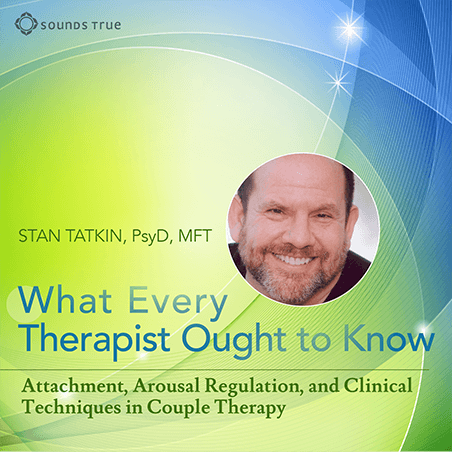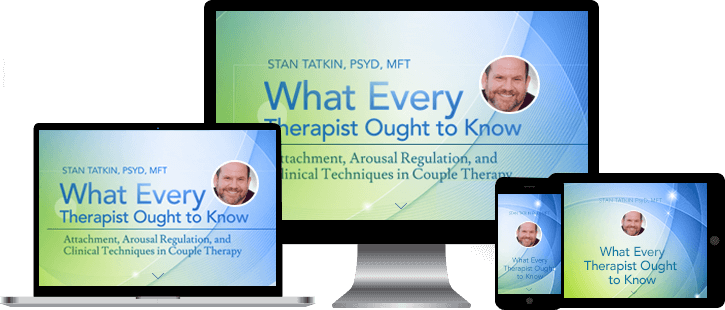Sounds True presents
What Every Therapist
Ought to Know
Attachment, Arousal Regulation, and Clinical Techniques in Couple Therapy
with

Stan Tatkin, PsyD, MFT
Welcome to What Every Therapist Ought to Know
Dear friends,
I am excited to invite you to join me in my new eight-week online course on What Every Therapist Ought to Know: Attachment, Arousal Regulation, and Clinical Techniques in Couple Therapy.
This course is based on a Psychobiological Approach to Couple Therapy® (PACT) and is created primarily with couple therapists in mind. However, the principles and skills taught in this course will easily translate for use by individual, family, and group therapists.
PACT is an innovative, nonlinear model that integrates attachment theory, arousal regulation, and developmental neuroscience. In this course, we will focus on attachment theory and arousal regulation.
Early attachment patterns influence brain and nervous system development, leaving lasting effects on relationships. Attachment theory identifies three main styles of interpersonal relating. We will examine each attachment style, including relevant developmental issues, common defense mechanisms, and how to identify these styles and work most effectively with people of each.
We will also explore how to assess arousal regulation. You will learn basic PACT interviewing skills, ways to help partners effectively regulate each other, and other simple but powerful intervention techniques used by PACT therapists.
What sets PACT apart from other models of couple therapy is its emphasis on what we call secure functioning. The PACT therapist’s primary goal is to move couples toward secure functioning—that is, toward a relationship characterized by true mutuality, collaboration, and equal power; one that is fair, just, and sensitive to the needs of each partner. In short, partners must care for each other while caring for the self.
In this course, you will discover the value of secure functioning and learn how to bring it home both with your clients and in your own relationships.
In addition to the weekly videos in the eight-week course, I look forward to the online sessions with you. In these meetings, we will have a chance to chat. I will be able to answer your questions and guide you as you begin to integrate PACT principles and skills into your own clinical practice.

Warmly,
Stan Tatkin, PsyD, MFT
An Overview of the Training Program

Here is everything that you will receive in the training:
- An eight-week online video training program with six-plus hours of teaching
- Two question-and-answer sessions
- Transcripts of ALL video teachings and calls
- Downloadable videos for lifetime access
- Ten Continuing Education credits will be available for purchase
What Every Therapist Ought to Know:
Relational Transformation, Nonverbal Experience, and The Psychology of The Therapist
Stan Tatkin, PsyD, MFT
We are pleased to present this psychotherapy professional training taught by Stan Tatkin, PsyD, MFT, covering the latest research and treatment approaches in the areas of couple therapy, attachment theory, and arousal regulation.
Stan is author of the acclaimed Wired for Love: How Understanding Your Partner's Brain and Attachment Style Can Help You Defuse Conflict and Build a Secure Relationship.
Stan will provide the theory and clinical tools you need to work more effectively with couples who are seeking more intimate, connected, and fulfilling relationships. Through both theoretical and experiential-based learning approaches, Stan will provide a foundational training in each of the primary attachment styles and how knowledge of our own and our partners' attachment histories is essential for a healthy relationship.
The training will focus on three primary areas of education, much of which was simply not included in graduate-level study:
- The latest discoveries in developmental neuroscience and the relevance of these discoveries in clinical practice
- Attachment theory and how an understanding of the theory is essential in helping our clients to flourish in relationship
- The latest research concerning the regulation of arousal—our own and that of our partners
These three areas will be woven together in a very practical way so that you can promote and catalyze securely functioning relationships in your clinical practice.
What's Inside Your Curriculum

Session #1: Overview of Attachment from a Psychobiological Perspective
In this session we will explore:
- The purpose of using attachment theory in couple therapy
- What attachment does and does not address
- Attachment versus personality theory
- Relabeling attachment categories for public consumption
- The secure culture versus the insecure culture
- Methods of attachment assessment

Session #2: Overview of Arousal Regulation
In this session we will explore:
- The purpose of understanding arousal theory in couple therapy
- Arousal versus affect
- Arousal dysregulation in one or both partners
- Therapist self-regulation
- Arousal bias
- Methods of arousal assessment

Session #3: PACT Interview Procedures
In this session we will explore:
- Specific techniques and skills of the PACT interview
- A sample dialogue between a therapist and a couple
- How to interact with and assess a couple during the interview
- The importance of acute attention to detail
- Regulating couples and oneself during therapy
- The challenge of pushing and engaging ourselves and our clients

Session #4: Therapeutic Stance & Secure Functioning
In this session we will explore:
- The therapist's beliefs and intentions in working with couples
- Why taking a firm therapeutic stance is critical for success
- How to articulate your stance to your clients
- Guiding couples in the direction of secure functioning
- The principles of secure functioning
- How to set goals effectively—and measure success accurately

Session #5: Working with Islands
In this session we will explore:
- Gaining a therapeutic alliance
- Developmental issues
- The PAI as intervention
- Differentials: personality disorder, culture, autistic spectrum, deficits
- Therapist countertransference
- Skills for working with Islands

Session #6: Working with Waves
In this session we will explore:
- Understanding Waves
- Developmental issues with Waves
- The PAI for information gathering for Waves
- Differentials: personality disorder, culture, psychotic disorders, PTSD
- Therapist countertransference
- Specific skills for working with Waves

Session #7: Avoiding Common Pitfalls
In this session we will explore:
- The time and patience required with the PACT approach
- What is it we're looking at? Making the right diagnosis.
- The willingness to be wrong as a therapist, again and again
- Our thoughts about what's happening versus the reality of what's going on
- How stress affects communication, memory, and perception
- The importance of clarity before action

Session #8: Bringing It Home
In this session we will explore:
- Gaining comfort and confidence as a couple therapist
- Getting along cooperatively and collaboratively with others
- Creating principles of engagement based on fairness, justice, and sensitivity
- Empowerment through secure functioning
- Becoming a voracious learner as a therapist
- Changing the world one couple at a time
This is a powerful course that will give you tools and skills to work on for years to come.
PLUS RECEIVE THIS SPECIAL BONUS:
As part of this eight-week training with Stan Tatkin, PsyD, MFT, you will also receive:
- A video session on the three organized attachment types.
Welcome to the What Every Therapist Ought to Know
Training Overview Summary

- An eight-week online video training program with six-plus hours of teaching
- Two question-and-answer sessions
- Transcripts of ALL video teachings and calls
- Downloadable videos for lifetime access
- Ten Continuing Education credits will be available for purchase
Plus, receive the following presenter bonus:
- A video session on the three organized attachment types
Frequently Asked Questions
How do I access What Every Therapist Ought to Know once I have purchased?
To access the course you will need to:
- 1. Log in to your Sounds True account.
- 2. Click on “DIGITAL LIBRARY” (located in the navigation bar at the top of the page)
- 3. Click on “ONLINE COURSES” (located on the left side of the page)
- 4. Find What Every Therapist Ought to Know
- 5. Click on “GO TO COURSE”
How do I access the presenter bonus files?
To access the bonus files through the course you will need to:
- 1. Log in to your Sounds True account.
- 2. Click on “DIGITAL LIBRARY” (located in the navigation bar at the top the page)
- 3. Click on “ONLINE COURSES” (located on the left side of the page)
- 4. Find What Every Therapist Ought to Know
- 5. Click on “GO TO COURSE”
- 6. Find and click on “Bonus”
To access the bonus files through the digital library you will need to:
- 1. Log in to your Sounds True account.
- 2. Click on “DIGITAL LIBRARY” (located in the navigation bar at the top of the page)
- 3. Click on “ONLINE COURSES” (located on the left side of the page)
- 4. Find What Every Therapist Ought to Know
- 5. Click on “DOWNLOAD”
What browsers do you recommend?
We recommend Safari for Mac users and Google Chrome for PC users (with a second choice of Firefox). We do not recommend using Internet Explorer—but if you must, please use version 11 or higher.
How do I obtain additional CE information?
A: For the CE Credits information page, go to soundstrue.com/store/cecredits/. If you have problems opening the link, please copy and paste the link into a new browsing session. If you have any additional questions, please contact R. Cassidy Seminars directly. Their contact information is listed below.
R. Cassidy Seminars
PO Box 14473
Santa Rosa, CA 95402
Toll free: 1.866.836.9895 | Phone: 707.566.7487
Request Form: cassidystrategic.com/ContactUs.aspx
We unconditionally guarantee your satisfaction with all Sounds True products for one year when purchased via our website. If you are not 100% satisfied with What Every Therapist Ought to Know for any reason, simply return it with receipt for a full refund.



